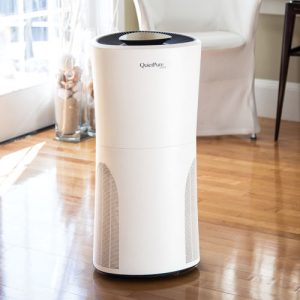Wildfires & Wildfire Smoke Safety Suggestions
 Sadly, there have been many wildfires in the US this year, Montana, California, Oregon, among many others. Many are in the vicinity of residential neighborhoods and are particularly dangerous as they are both hazardous to your home and to your health. If a forest fire is large enough the sad reality is at least some fire damage to your home simply cannot be prevented, but the long term damage to your health can be even worse. It’s best to have a home fire safety plan in place, so you can be ready. Follow our fire safety suggestions to help you keep you and your loved ones safe if there is a fire.
Sadly, there have been many wildfires in the US this year, Montana, California, Oregon, among many others. Many are in the vicinity of residential neighborhoods and are particularly dangerous as they are both hazardous to your home and to your health. If a forest fire is large enough the sad reality is at least some fire damage to your home simply cannot be prevented, but the long term damage to your health can be even worse. It’s best to have a home fire safety plan in place, so you can be ready. Follow our fire safety suggestions to help you keep you and your loved ones safe if there is a fire.
Wildfire Safety Plan
The best way to learn about the status of the wildfire in your neighborhood is to listen to your local news and weather stations on the television, radio, or internet. All these channels will be giving you updated information throughout the day and greatly improve your fire safety. It also a really good idea to have a rechargeable emergency radio handy just in case the power goes out, so you can stay informed about what’s happening with the fire.
What are the Health Symptoms from Wildfire Smoke?
Thick smoke from wildfires can burn and irritate your eyes, and precipitate coughing and respiratory problems. The young and elderly can be particularly at risk, as well as all others with heart or lung disease problems. The smoke that is produced from wildfires is a mixture of gases and fine particles from burning trees and plants.
These are the symptoms which should most concern you:
- Smoke irritates the sinuses, causes coughing, headaches, chest pains, runny nose, and difficulty breathing.
- Those with heart disease may experience rapid heart beat, fatigue and chest pain. If this happens please consult a doctor.
- If someone in your family already has some kind of respiratory ailment such as COPD, asthma or allergies, their symptoms are exacerbated and can include wheezing, trouble breathing, chest tightness, sinus pain and coughing.
- Even quite healthy people experience these symptoms if exposed to enough smoke, called smoke inhalation. If you have just a cold, the smoke will likely affect you more severely. However, these symptoms will abate quickly once the air clears.
Wildfires: How close is Dangerous?

Wildfires can affect your breathing as much as ten miles away and anything less than a mile is considered extremely hazardous. Most likely you will be cautioned by your local weather station to reduce your level of physical activity outdoors.
Forest Fire and Wildfire Health Safety Plan
- Limit your exposure to smoke as much as possible.
- Listen to your local weather stations for your proximity to the fire.
- Stay indoors and keep windows and doors tightly closed.
- Keep the air as clean as possible with the use of the QuietPure Home + Smoke air purifier.
- Do not add to the pollution by burning candles, fireplaces or even limit the use of your gas stove.
- Run your air conditioner but close down any fresh air intake.
- If anybody in the family is in a high risk group, contact a doctor if symptoms worsen and take extra precautions.
- Pregnancy and smoke inhalation have been associated with low birth weights, so pregnant women should be extra cautious.
- If you are just feeling too hot inside the house, it would be better just to close up the house and temporarily vacate it and go to a local clean air shelter. In the meantime, pull down the shades to protect from the sun and run the fan on auto from the air conditioner which provides some feeling of cooling.
- Drink lots of water and take cool showers if you need to cool down.
- Dust masks found in hardware stores will not be sufficient to give protection against finer lung penetrating particles less than 3 microns. Neither is a wet towel. This fact sheet on the topic of respirators at which is provided by CDC’s National Institute for Occupational Safety and Health is very helpful.
- Avoid driving if possible (except if you are instructed to evacuate). If you have to drive put the fan onto recirculate and keep the windows closed. Never leave pets and children unattended.
Planning and Surviving Wildfires
If you live in an area that is susceptible to wildfires, there are many things you can do to improve your fire safety plan to know what to do both during and after a wildfire. We recommend the following tip sheet.
Smoke in General
Smoke has a complex chemical composition and the health hazards associated with it. The three air toxins to be most concerned about with wildfires are benzene, formaldehyde, and acrolein. These toxins cause severe respiratory problems and are carcinogenic. Remember, it is also the smaller lung penetrating particles that you need protection from which is why we recommend the use of air purifiers specially designed to cope with both smoke and these tiny particles.




